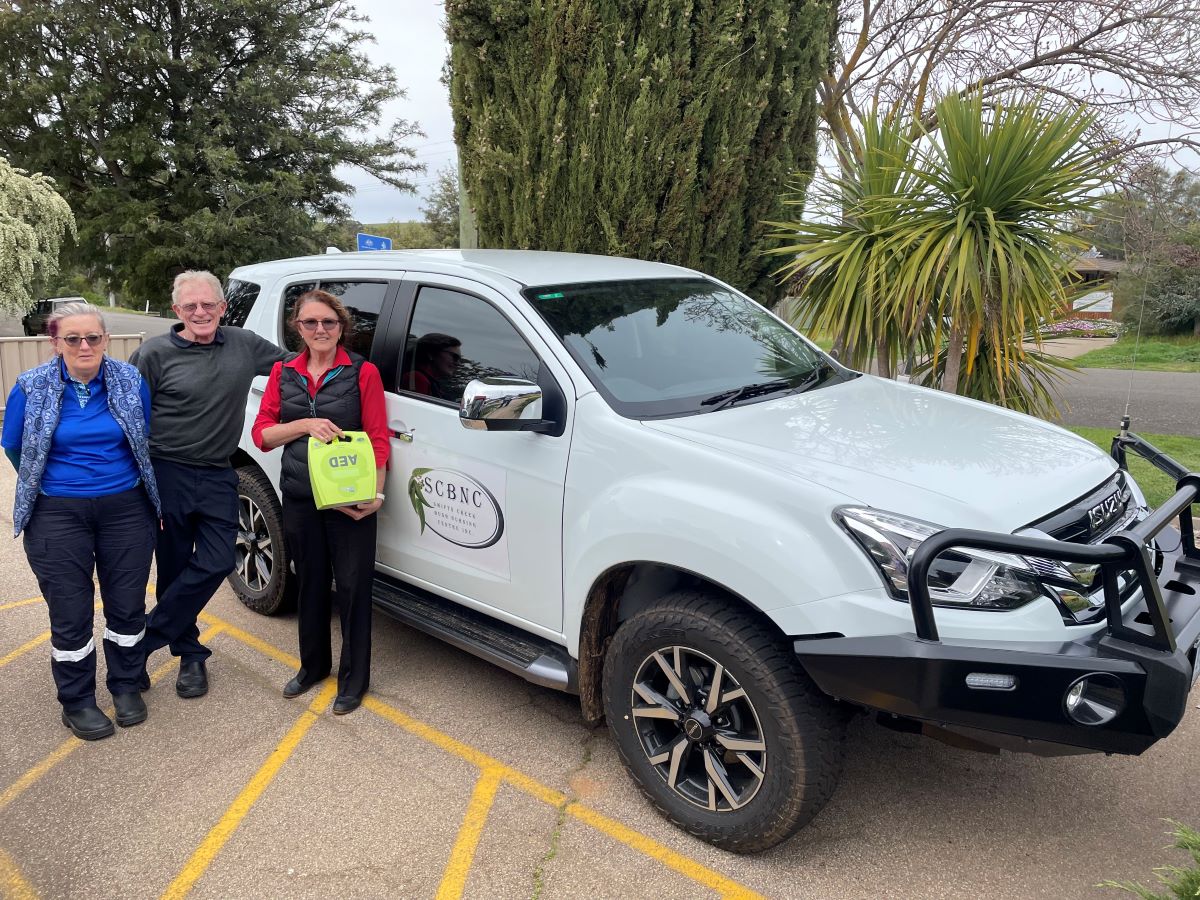28 October 2022
Best of care from our bush-based nurses

Pictured: Jacinta MacCormack, Warren Howden and Sue Carroll from Swifts Creek Bush Nursing Centre
From Dingee to Lockington, Walwa to Swifts Creek, bush nurses based at 15 clinics in remote Victorian locations are on call around the clock caring for their community members.
From being first on the scene at accidents and emergencies to helping with pension and job applications, bush nurses need a special blend of training, resourcefulness, courage and the ability to think on their feet to do their jobs.
Sandi Grieve, who is CEO of the Walwa Bush Nursing Centre (BNC) in north-east Victoria, has served the local Walwa community and the surrounding farming regions of Corryong and Tumbarumba in NSW for more than 33 years.
“It’s one of the best jobs in Australia because you work really closely with your community and see the difference you make in people’s lives at vulnerable times,” says Sandi.
“Our support extends to helping people with work and housing-related matters and social issues, because those things impact health too. It’s an incredible privilege.”
Nurse Manager Sue Carroll, of Swifts Creek Bush Nursing Centre, which services Swifts Creek and neighbouring communities in Ensay, Omeo, Dinner Plain and Benambra, relishes the complexity of her role.
“I enjoy the challenge of working on my own – my training means I can provide a lot of vital services to our community without them needing to leave their local area,” says Sue.
HSV’s Supply Chain Surety team recently worked with 15 bush nursing centres across Victoria to secure access to an important medicine in shortage due to global supply chain issues.
“It’s extremely important these centres have stock of critical products. They are often in remote locations where deliveries may be less frequent and in an emergency situation there may not be time to get stock from Melbourne,” says HSV Director Supply Chain Surety Kate Warren.
As Eligible Service customers of HSV, state-funded bush nursing centres may apply to access relevant HSV Collective Agreements. Woomelang and District Bush Nursing Centre in north-west Victoria is one such centre, already benefitting from access to nine HSV Collective Agreements and applications for more agreements underway.

Pictured - Mel Steen (left) and Sandi Grieve from Walwa Bush Nursing Centre
Here we ask Sue and Sandi a few questions about their roles.
What kind of care do you provide at your centre?
Sue: At Swifts Creek BNC we provide 24-hour emergency response, antenatal shared care, palliative care in the home, women’s and men’s health nights, first aid training for new parents, wound care, treatment for severe asthma and croup in children, mental health support and referral, immunisations, pathology, farmer health checks, domiciliary care for the elderly and isolated, lunches for isolated over 65s – and much more.
Sandi: Walwa BNC provides 24-hour response to emergencies like heart attacks, car accidents and farming incidents, care for all sorts of serious conditions such as delirium, pneumonia and palliative care.
We have a high percentage of older people still actively working on farms which can keep them fit but they are vulnerable to accidents and muscular strains. We also help our community members with applications for jobs or different types of pensions because a person’s finances are also incredibly important to health.
Do Bush Nursing Centres provide similar services?
Sue: Each centre is unique and the services it provides can depend on the qualifications and scope of practice of the nurses. Like a lot of bush nursing centres, we are first responders to ambulance calls in our area. I am a Registered Nurse, Midwife, Nurse Immuniser, Women’s Health Nurse, Remote Area and Remote and Isolated Practice Nurse. The care I provide patients in our community means they don’t have to travel as frequently to other towns or cities for GP or hospital care.
Sandi: Each bush nursing centre develops in response to community needs. Walwa is a little different to other centres because we have a GP clinic on site. We respond when someone in our community calls 000 and our partnership with Ambulance Victoria allows our nurses to work like paramedics. We are lucky to have a volunteer Community Emergency Response Team (CERT) in our community and we often work in tandem with them.
What makes a successful bush nurse?
Sandi: You might think an emergency department or ICU background is important, but in my experience that doesn’t necessarily mean a person has the right attributes for a bush nursing role. The most important skill is being good on your feet and a sound decision maker. Bush nursing is completely different to other emergency or acute care. You might be woken at 3.00 am to go to an accident or episode on your own, you need to take control of a situation which may mean performing CPR and communicating with family members. There are so many decisions that need to be made quickly and independently.
Sue: You have to enjoy working on your own and be prepared to complete a wide range of training. There are many memorable experiences in this job, some are happy and sadly some are very traumatic. We often require peer support after such incidences.